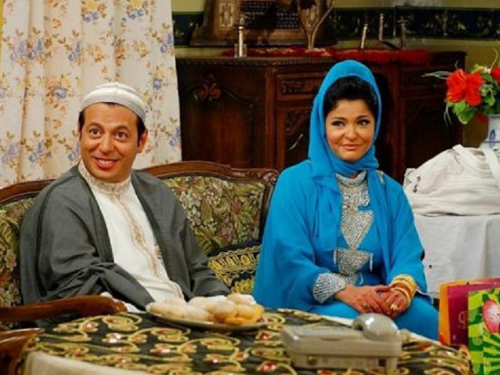
A family’s strongman in an Upper Egyptian village sits confidently home as he receives congratulations for his marriage to a beautiful young Cairene. The rest of the family men envy him, as their poor illiterate wives are “so ugly that they will be used on judgment day to scare the infidels.”
The scene from the TV show “Our Master, Sayed” is among many offensive ones in this year’s Ramadan TV dramas, where women are constantly portrayed as sex objects and polygamous men shown as attractive.
“The Fourth Wife,” starring Mostafa Shaaban, narrates the diaries of a young rich businessman who lives with his three wives in his villa and changes his fourth wife every now and then.
Shaaban, who wears a galabeya and holds prayer beads as a sign of piety, is the expert on women’s issues among his friends, from whom they all learn.
“It is a message to women to remember not to cross the lines … to remind them of what their role should be [after the developments of the past year],” argues Fatma Emam, a researcher at the Nazra Center for Feminist Studies.
Women have actively participated in the street movement over the past year and a half. Yet female political activists are subject to systematic waves of sexual harassment, and some lawmakers have requested to amend personal status law, bringing down the official marriage age for women from 16 to 14 years of age.
Emam argues that the revolution has not brought about social change yet. That would naturally take more time than political change, and it is strongly reflected in current media practices.
Media messages vs. the audience
“It is too early for Egypt to witness a revolutionized drama scene,” says Hoda Zakareya, a political sociology professor at Zagazig University. “Both investors and audiences have not changed.”
Polygamy, for instance, is a rejected social practice in Egypt, with the second wife often perceived as a “kidnapper of men.” Still, TV dramas like “The Fourth Wife” and 2001’s “Haj Metwally” about an old rich businessman who has four wives, have been attracting huge viewership. So media investors play on certain entertaining cultural views to appease the public and generate more profit, says Zakareya, adding that such shows are like “paid marketing of polygamy as the sole solution for female spinsters in contrast to studies showing that for every non-married female, there are two males who remain unwilling to marry due to financial constraints.”
Solutions are long-term
The offensive messages being promoted make the legal solution to some an attractive option to alert society to insulting media discourses.
“Pursuing legal action will foster public debate and alter people to the nature of the destructive media messages it receives, but I firmly believe that it is a double-edged weapon,” says Emam. “[Taking] legal action means we cannot face these practices so we resorted to law to shut them down.”
Zakareya also believes the battle is more complicated because shutting down such works will not end the stereotypes and images associated with them. These practices and stereotypes need to be addressed more on a grassroots level.
“The intelligentsia have, unfortunately, left the space open for religious extremism to fuel such insults to women in society,” Zakareya argues, adding that social powers are now concentrated in the hands of sheikhs who usually do not receive the suitable religious education to inform the public.
The public is thus vulnerable when it comes to gender roles. Zakareya asserts that “the issue becomes a social taboo where every individual should act according to the designed social construction of your gender. Media cannot work away from this line.”
A shorter version of this piece was originally published in Egypt Independent's weekly print edition.




